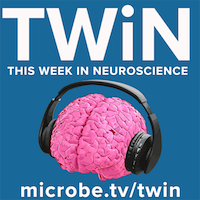TWiN reveals that proteins travel from the blood to the brain where they are taken up by microglia, revealing a new mode of communication between the brain and the periphery. Hosts: Vincent Racaniello, Tim Cheung,…
TWiN discusses experiments which show that high-fidelity memories that lose their precision with time depends on reorganization of hippocampal circuitry. Hosts: Vincent Racaniello, Jason Shepherd, and Tim Cheung Click arrow to playDownload TWiN 060 (47 MB…
Tim explains AI co-scientist, a tool released by Google, which it hopes to help scientists generate hypotheses and research proposals, and to accelerate the speed of scientific and biomedical discoveries. Hosts: Vincent Racaniello, Tim Cheung,…
TWiN explains a study showing that when a mouse is confronted with an unconscious conspecific, it engages in behavior including tongue-dragging to resuscitate the animal via a tongue-brain connection. Hosts: Vincent Racaniello, Tim Cheung, and…
TWiN discusses a study showing that repetitive injury reactivates HSV-1 in a human brain tissue model and induces phenotypes associated with Alzheimer’s disease. Hosts: Vincent Racaniello and Tim Cheung Click arrow to playDownload TWiN 057 (29…
TWiN explains a study showing that while groups of neurons, form the basis for memory, astrocytes are key components of the adaptive reponse to learning experiences, and regulate the flow of information during circuit plasticity…
TWiN explains the identification of a brain circuit and periodic branch-specific neurotransmitter deployment that regulates organismal adaptation to photoperiod change. Hosts: Vincent Racaniello, Jason Shepherd, and Tim Cheung Click arrow to playDownload TWiN 055 (42 MB…
TWiN explores how pregnancy leads to modifications in brain structure and function that may prepare the mother for parenting. Hosts: Vincent Racaniello, Jason Shepherd, and Vivianne Morrison Click arrow to playDownload TWiN 054 (39 MB .mp3,…
Joseph Paton and Felipe Rodrigues join TWiN to explain how they used temperature manipulation to alter the speed of neuronal dynamics in the dorsal striatum of rats, a manipulation that selectively slowed down or sped up time perception, illuminating the mechanisms of time-based decisions.
Mauro Costa-Mattioli joins TWiN to discuss the results of a placebo controlled, double blind clinical trial of a probiotic which improved social behavior but not autism severity in children with ASD.





